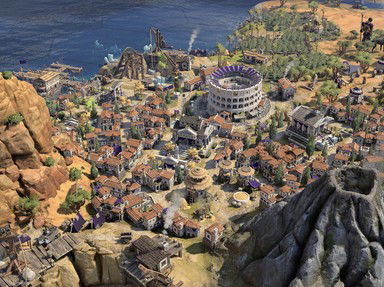Quiz Answer Key and Fun Facts
1. Let's begin the game of "Civilization" for Macintosh, sometimes referred to as "Civilization I" or "Civ I". It is 4000 BC. You have the choice to lead one of sixteen 'tribes' which will you fashion into a civilization, and you can choose to have up to seven tribes compete against you. Which civilization is not correctly matched with its leader?
2. The land masses and climate of the world are generally randomized, but you can play on 'Earth' as well -- seven continents and all.
3. An important task at the beginning of the game is deciding where to build your cities. Settlers go out, moving one tile at a time. Which of the following would be the worst kind of terrain tile to build on?
4. As you play, you develop Civilization Advances, which could be technological or cultural. Each Advance allows you build a City Improvement. For example, Ceremonial Burial lets you build a Temple, and Religion lets you build a Cathedral.
Which Civilization Advance lets you build City Walls?
5. As you play, an alert flashes on your screen: "A usurper claims that you are not the rightful king! To prove yourself worthy, you must answer this question: 'Which civilization advances are required to gain the advance in the picture below?'"
Pictured is a kite and lightning. You know that represents Electricity. So which pair of Advances do you choose as pre-requisites for Electricity?
6. In addition to buildings, transportation, and military units, cities can also build Wonders of the World -- and there are far more than seven of them! Each Wonder also confers a benefit upon the civilization that builds it.
Which Wonder is INCORRECTLY matched with its benefit?
7. Another task you must do as leader of your civilization is to subdue or better yet prevent revolts. Which governments are the most vulnerable to unhappy citizens leading a rebellion?
8. The Germans are getting too big and are encroaching on your territory, and you decide you want to conquer them. Your peace treaty, however, prevents you from attacking them first. Which of the following is NOT an option?
9. You, the leader of the Greeks, attack Thebes, a walled city belonging to the Egyptians. You are very advanced and attack with a Tank. Thebes unfortunately only has obsolete units like Phalanxes to defend it. In "Civilization", as in real life, there is no contest, and there is 100% chance of capturing Thebes.
10. If you don't care to conquer all other civilizations, what is another way to 'win' the game?
Source: Author
gracious1
This quiz was reviewed by FunTrivia editor
kyleisalive before going online.
Any errors found in FunTrivia content are routinely corrected through our feedback system.

